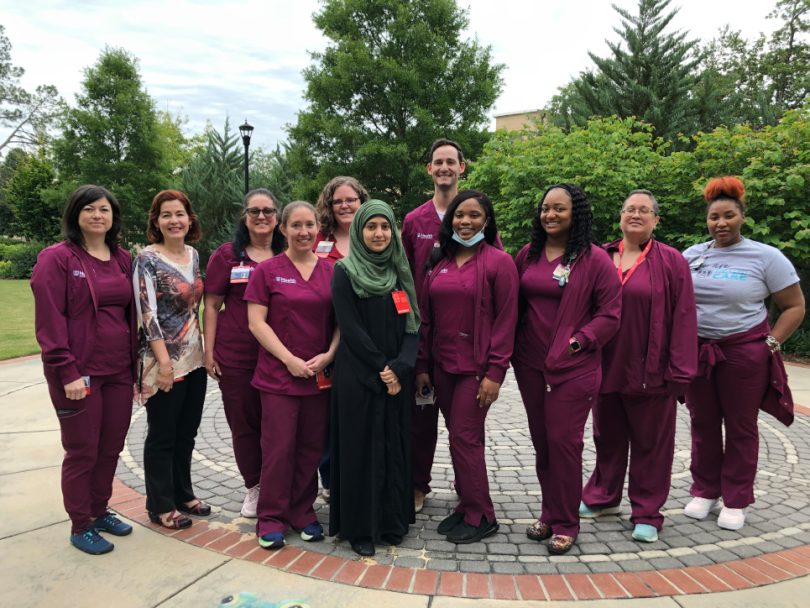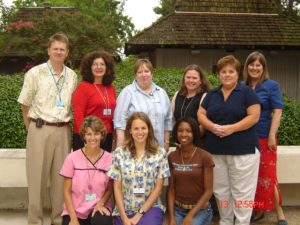For 55 years, the Histocompatibility Immunology (HLA) Lab has been a part of the Augusta University Medical Center team. Although roles have changed throughout the years, the department is excited to celebrate some wonderful achievements. The HLA department supports the bone marrow, stem cell and solid organ transplant programs, and other clinics that treat certain diseases. As with all lab testing, performing these HLA tests aid physicians in making a prompt and proper diagnosis with a swift and accurate treatment regimen.
The team is comprised of histocompatibility lab scientists, led by Rachel Wahlert, with director Dr. Valia Bravo-Egana, at the helm. HLA, or human leukocyte antigen, is a type of receptor on the surface of our white blood cells, platelets, and most tissues in our bodies.
Our bodies use them to recognize self from non-self. HLA aids in building immunity to things, which can be both good and bad. It can be good when we get vaccines or day to day interaction with different environmental molecules. It can be bad if a person gets a blood transfusion, an organ transplant, or tissue graft of some sort. Even pregnancy can cause a woman’s body to develop immunity to her baby.
HLA tests are different from other lab tests. Testing methods go through rigorous validations before they are approved for use with patient samples. They are highly complex tests that require several hours and sometimes days to perform, and hours to analyze. One of the tests we perform in HLA is antibody identification.
This is for bone marrow recipients that may not be able to find a fully compatible donor. We also perform this test on pre-transplant and post-transplant kidney patients. On pre-transplant patients, we use this to exclude any incompatible donor types. On post-transplant patients, we use this to monitor antibody production that may lead to organ rejection.
The HLA antibody results help physicians know whether the patient needs more immunosuppression or not. For our bone marrow and kidney transplant candidates and donors we use molecular testing methods to determine either a low-resolution or high-resolution HLA typing.
This, along with antibody testing, helps us to determine favorable donors for transplant recipients. After a potential donor is chosen for a patient, we perform a flow cytometry crossmatch. This helps to predict how well the donated organ will survive in a recipient. We also perform molecular testing for disease association. We test to see if a patient has a particular associated HLA typing or allele that may support a suspected diagnosis or predict a potential medication reaction. This highly abbreviated chart shows just some of the suspected diseases or medication interactions for which we test.
| A29 | Birdshot chorioretinopathy |
| B27 | Reactive arthritis, acute anterior uveitis, and ankylosing spondylitis |
| B*57:01 | Hypersensitivity to Abacavir (HIV medication) |
| B*58:01 | Hypersensitivity to Allopurinol (gout medication) |
| B51 | Behçet disease |
| DQ2 and DQ8 | Celiac disease |
With over 250 papers published by our HLA directors and other HLA staff during our 55 years in operation, we have always had such incredible talent working to help our patients.
Past Directors Past Supervisors
Dr. Arthur Humphries Debbie Davis
Dr. Dan Doran (Assistant Director) Diana Friberg
Dr. Shyuan Hsia Nancille Peacock
Dr. Mary Sue Leffell Jim Houston
Dr. Sandra Helman Cathey Klimek
Dr. Valia Bravo-Egana Rachel Wahlert
Within the past 2 years, we have begun to perform high resolution HLA typing for our bone marrow patients by next generation sequencing. Being able to complete this testing in-house decreases our turnaround time and helps to improve patient care. Every year, more diseases or conditions are found to have some HLA associate.
Our lab takes pride in helping to support physicians as they discover new research that may help treat their patients. We are in the process of validating chimerism testing to be performed in-house. This test is used to monitor engraftment for bone marrow transplant recipients and allows physicians to follow how well the donor cells are doing within the recipient which is extremely important for predicting relapse.
We look forward to continuing to help our patients for many years to come.



